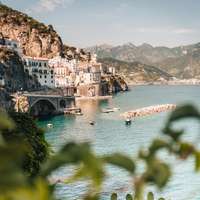
A cultural guide to Rome
By Anna Hart
March 2024
With its ancient ruins, famed food scene and high-spirited street life, Italy’s characterful capital is the place to live la dolce vita
Your essential guide to the best things to see and do in Rome. Find more travel inspiration for more amazing cities here.
Rome is the result of 3,000 years of emperors, aristocrats, popes, architects and engineers furiously trying to outdo each other. With the partial remains of this empire—such as the Roman Forum, the Colosseum, the Appian Way and the Pantheon—dominating the center, there’s no forgetting that this city once ruled the western world. However, today the Italian capital exudes the sort of modern charisma that other cities can only dream of: It’s a pulsating, multicultural city that rewards visitors who get out on foot and stray far from the selfie sticks.

Peter’s Basilica is the centerpiece of Vatican City

The Colosseum dates back to 80 C.E.
Art & architecture
Immediately recognizable landmarks like the Colosseum, Roman Forum and Pantheon testify to Rome’s heyday as caput mundi (capital of the world) when the city had a then-huge population of a million. Today, some 10 million visitors flock to the city annually, to marvel at the grandeur of the Spanish Steps, gaze in awe at St. Peter’s Basilica’s dominance over the Vatican, and debate the comparative merits of the Fiumi and Trevi fountains.
Baroque splendor at the Trevi Fountain

The elegant Via Veneto
Less ancient but no less evocative are the ivy-covered piazzas of Regola, the beautifully landscaped Villa Borghese gardens and the quaint district of Trastevere, hugging the banks of the Tiber River. Although no match for Florence when it comes to galleries, visitors to Rome can juxtapose the refined elegance of Galleria Borghese with MACRO, the Museum of Contemporary Art of Rome, housed in a former slaughterhouse.
Expert tips
The essentials
Fly to Rome Fiumicino Leonardo da Vinci Airport (FCO) or Rome Ciampino International Airport (“G. B. Pastine”). From Rome Fiumicino, take the Leonardo Express train to Termini Station for a 32-minute transfer to the city center. Alternatively, hop in a taxi or ride share from the airport to the center. This should take around 45 minutes, but traffic can be a problem.
Tipping is not expected, but rounding up the bill or leaving a small tip is appreciated. Italian is the local language, but English is widely spoken in tourist areas. Use “ciao” for “hello” and “grazie” for “thank you.” Keep a close eye on your possessions while exploring Rome; the city is known for its pickpockets.
Getting around
Rome’s historic center is best explored on foot as much of the city is now pedestrianized. Walk between iconic sites like the Colosseum, Roman Forum, Vatican City, and Trevi Fountain. Rome’s Metro is made up of three lines: A, B, and C. Purchase a Roma Pass for unlimited public transportation and skip-the-line access to some attractions. Buses and trams are also available across much of Rome, and offer a convenient way to travel while still seeing the sights. Use rideshare apps or catch a taxi from designated stands. Taxis are metered and should be operating on “Tariffa 1” on most journeys.
Accessibility
Lines A and B of the Metro have limited accessibility, but line C is accessible throughout. The Vatican Museums provide free guided tours for travelers with visual impairments, including tactile reproductions of famous sculptures and artworks.
LGBTQ+
Via di S. Giovanni in Laterano (aka Gay Street), Testaccio and Monti are home to LGBTQ+ friendly venues, bars, and clubs, and have a welcoming atmosphere. Rome Pride in June is a vibrant celebration, with a parade and performances between Piazza della Repubblica and Piazza Venezia.
Food & drink
“Do every act of your life as if it were your last,” wrote the emperor Marcus Aurelius nearly 2,000 years ago. Today, this sentiment has been distilled into Rome’s commitment to pleasure-seeking every mealtime; Romans live like every bite or sip could be their last. Every Italian city has its signature breakfast pastry, and in Rome this is the cream-crammed maritozzo; taste your first at cult bakery Marigold, alongside a doppio (double espresso).
Foodies flock to Regola, where double-Michelin-starred restaurants like Il Pagliaccio rub up against elevated street food vendors like Supplizio fry shop. Fans of the late, great Anthony Bourdain should make a pilgrimage to Rimessa Roscioli—he rejoiced over the produce and wine at this salumeria, or deli, which sits next to a formal restaurant with one of the best tasting menus in town.

Breakfast like a Roman with a maritozzo and double espresso

Cacio e pepe is a quintessential lunch order

Flights, camera, action: Set-jetting in Italy
From Roman Holiday to Ripley, these are the best filming locations to visit in Italy
Shopping
Rome, like many Italian cities, is a delight to shop, and Prati is one of the best areas to do it. Make a beeline for Cola di Rienzo and Via Ottaviano, where you’ll find a mix of international labels and Italian fashion and homewares, with homegrown brands like Twinset and curated stores like Colonna. If vintage is more your vibe, it’s the cobblestoned streets of Monti that you want, with secondhand shops like Humana alongside more upscale vintage stores like Pulp Vintage and Blue Goose.
Watch before you go
Rome is a naturally cinematic city, and countless films have attempted to bring it to life on screen. The Audrey Hepburn vehicle Roman Holiday is a must-watch, but perhaps the most iconic Rome-set movie of all time is La Dolce Vita, which sees Anita Ekberg flouncing magnificently in the Trevi Fountain. For something more historically inspired, there’s always Ridley Scott’s Gladiator, and the Anthony Hopkins-starring The Two Popes.
If your travels are directed by your taste buds, base yourself near Testaccio, originally built around the Mattatoio slaughterhouse, and credited with giving Roman cooking its famous zero-waste nose-to-tail ethos. Cucina Romana is about extracting maximum pleasure from whatever you have, and the Nuevo Mercato di Testaccio, a glass-roofed food market, shelters hundreds of innovative food vendors. Decision fatigue? Many Romans swear Casa Manco Pizza offers the best by-the-slice pizza in the city.
Walkable, genteel and increasingly international, this picturesque district is characterized by cobblestone streets, magical piazzas and atmospheric neighborhood restaurants. Just south of Vatican City and hugging the banks of the Tiber, it’s a particularly good base for families. Book an elegant boutique bolthole like Hotel San Francesco, and spend evenings sipping a Peroni in Piazza di San Calisto or Piazza Santa Maria with a young and bohemian after-work crowd.
Nestled behind St. Peter’s Basilica in Vatican City on the west bank of the Tiber River, Prati is a perfect base for ardent shoppers and visitors who want to be able to walk everywhere but escape the hubbub in their hotel room. Famed for art nouveau architecture and upscale boulevards lined with trattorias, wine bars and independent boutiques, it’s one of the most sought-after addresses in town. Stay at the hip yet family-friendly Mama Shelter, with a rooftop bar, just a stone’s throw from the Mercato Trionfale food-hall.

Anna Hart is a culture writer specializing in adventure travel and positive-impact tourism. Her work has appeared in Vogue, The Wall Street Journal, and The New York Times, and she is the author of the travel memoir Departures.
Hotel deals in Rome






